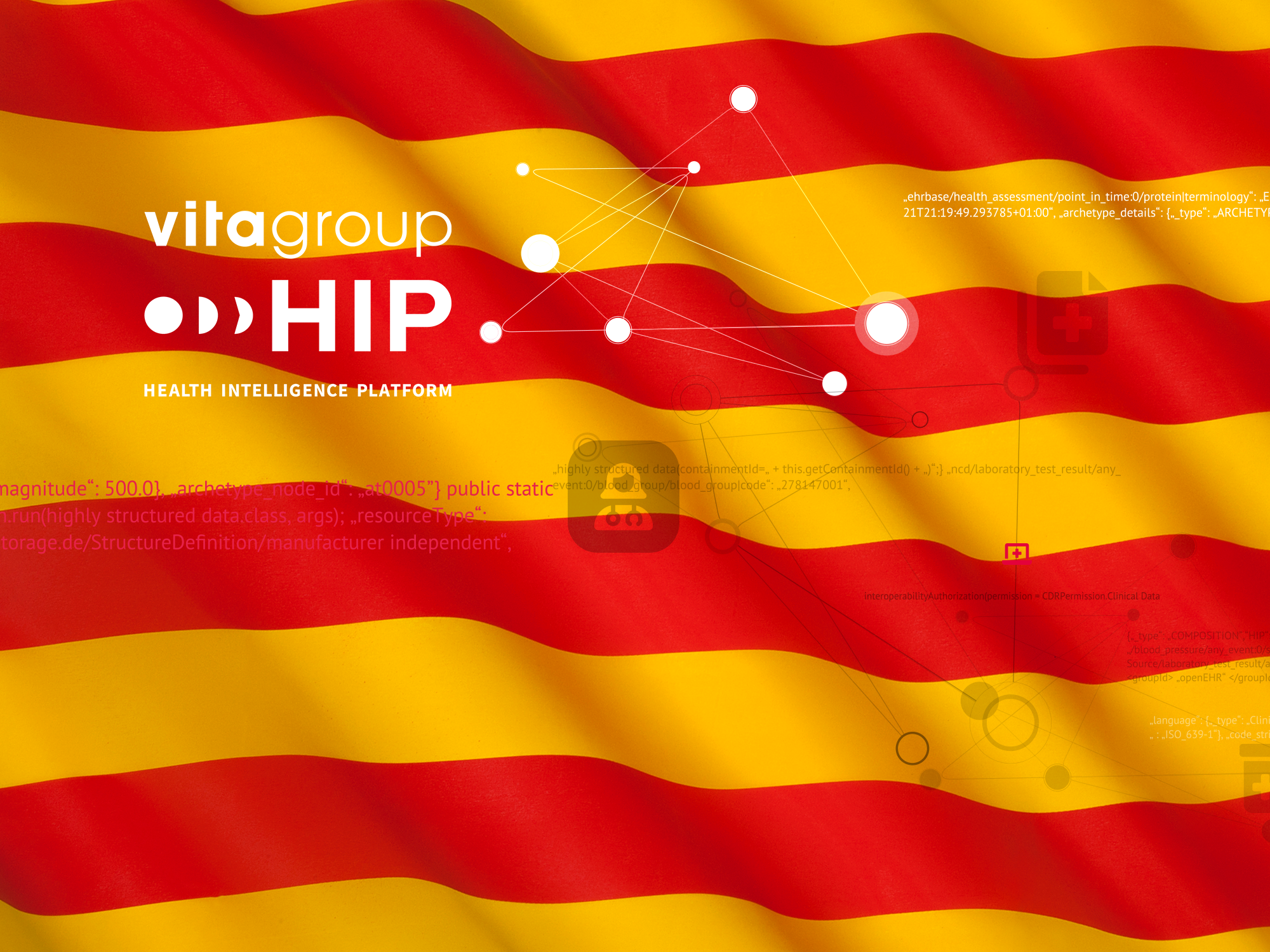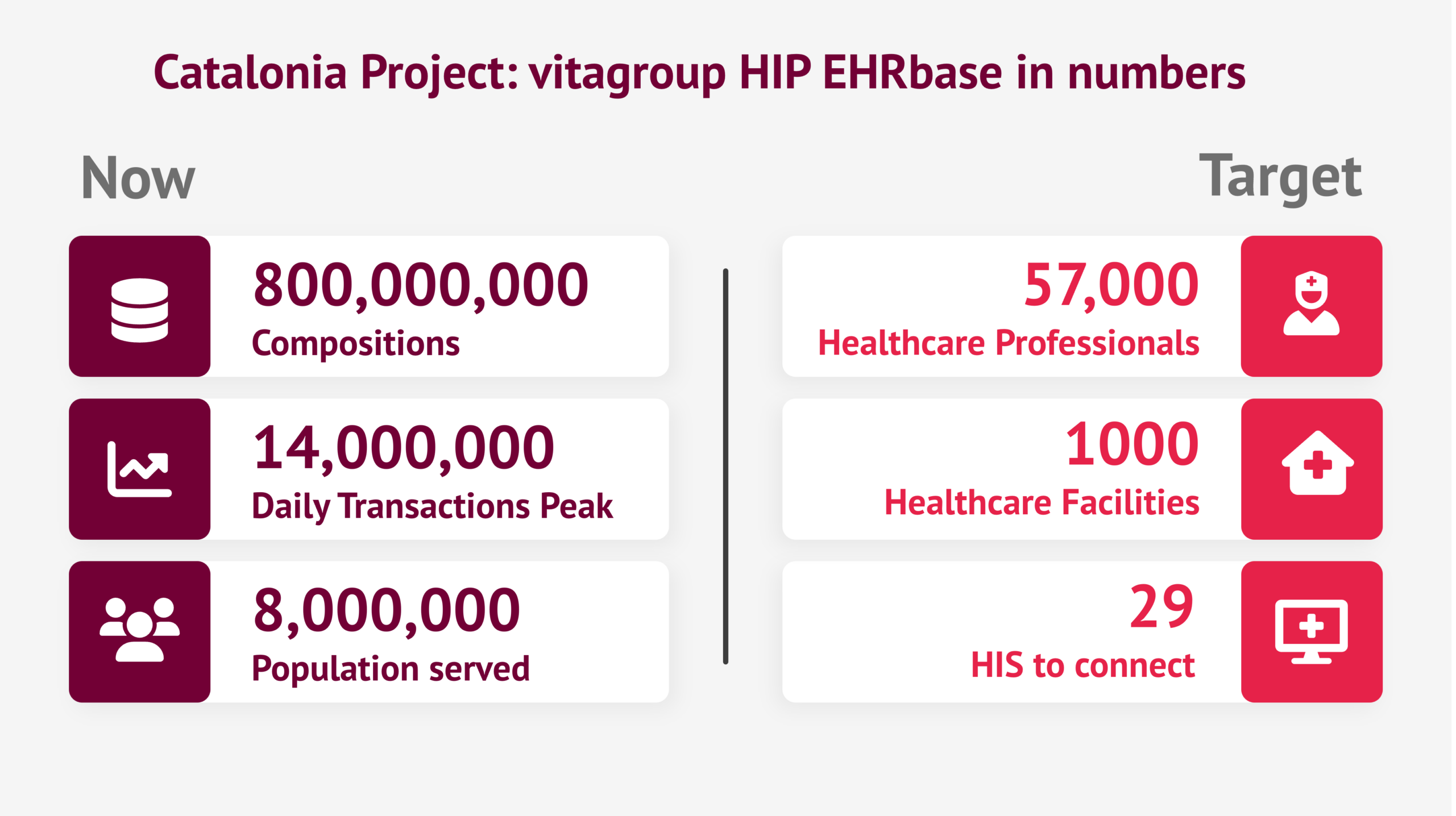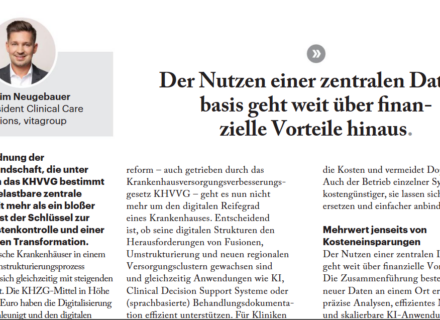Catalonia: First European open data digital health project of its scale
13 million EHRs moved and billions of data points processed
Catalonia sets new standards with its digital health strategy and new information system model based on openEHR. Centre of the innovative digital health platform and the main technological piece allowing to build the new longitudinal patient-centric EHR: vitagroup’s Health Intelligence Platform (HIP).

Healthcare industry players and health regions are following the Catalan Digital Health Initiative with great interest, since this is the first European project of this scale.
Synchronizing national and regional efforts and unifying health data across Catalonia to improve the connectivity with other Spanish regions
Spain‘s health sector is undergoing significant transformations, not only within Catalonia but across all 17 autonomous communities/regions. As an autonomous community, Catalonia independently manages its health services and is leading the way in modernizing and unifying its health data systems. The initiative focuses on creating a comprehensive Electronic Patient Archive (EPA) and a unified health record system within Catalonia. This effort reflects a broader trend towards digital consolidation in healthcare, with Catalonia at the forefront of innovation.
By implementing these advanced digital health solutions, Catalonia aims to improve patient care, enhance data accessibility for healthcare professionals, and streamline healthcare delivery across the region. These efforts will allow the region to better connect with the Spanish National Digital Health Record, a nation-wide system allowing Spanish citizens to move across the 17 regions with their most relevant health information.
Catalonia’s open approach
Catalonia is leading the way in managing its health data. By choosing openEHR, a framework that supports the use of open standards for electronic health records, Catalonia is demonstrating its commitment to building a health data system that is both adaptable and compatible with other systems. This strategy will allow Catalonia to keep a strong grip on its digital health landscape, customizing it to meet local needs while still following international norms.
IBM and vitagroup partnership
IBM and vitagroup are working together to make health data more consistent and easier to use for both primary and secondary use cases. Their main goal is to create an end-to-end clinical data platform (based on vitagroup’s HIP Clinical Data Repository) that brings together all the health records in one place, unifying and homogenizing the electronic health records across the region. This will help doctors and other healthcare professionals to use the data more efficiently. Additionally, the secondary use of this unified data will benefit researchers, public health officials, and policymakers, enabling them to gain valuable insights for population health management, medical research, and healthcare policy development.
Historical context and current developments
The project was officially launched on June 1, 2023, with IBM as the primary contractor, marking the start of an ambitious phase to build the technical backbone required for the new digital health strategy. The first phase, which ended in November 2023, focused on building up the necessary technological infrastructure, including the establishment of on-premised data centers managed by the Centre de Telecomunicacions i Tecnologies de la Informació (CTTI).
These data centers are critical as they host the highly available infrastructure that supports all governmental digital activities in Catalonia. Currently, two planned data centers are operational, with physical infrastructure being provided by Kyndryl, including all necessary hardware, security settings, and network components.
Integration and Optimization Challenges
The integration process has begun, with billions of historical health compositions (care events) being migrated to this new infrastructure. Over 13 million Electronic Health Records (EHRs) have already been moved from various IT silos, representing a significant step towards consolidating Catalonia‘s fragmented health data landscape.
With a population of more than 8 million, plus visitors and non-residents requiring medical services, the scale of this initiative is enormous. The challenge now lies in optimizing the infrastructure to handle such extensive data efficiently.
vitagroup’s objectives at this phase are to make processing health data faster and more efficient, so the implementation of EHRbase 2.0 has been very helpful, as well as the use of Yugabyte high-performance scalable database solutions.

Future steps: From infrastructure to care
While the current focus is on building and optimizing the digital infrastructure, the primary goal is to utilize this platform to improve clinical care. The infrastructure itself is not yet being used actively on the care side, but it sets the foundation for the next stages, which will involve integrating care delivery systems with the digital records.
The ongoing vitagroup’s projects with IBM are pivotal in this regard, as they aim not just to harmonize existing data silos but also to lay the groundwork for future innovations in patient care. One such innovation case is being developed with Medblocks. The Virtual EHR Sync Service will connect different hospitals’ health record systems to a central system, ensuring that a patient’s medical information is accessible and up-to-date across all healthcare organizations. This service will work with various health record systems without favoring any particular vendor and manages data in different formats to keep everything synchronized efficiently.
Conclusion
Catalonia’s digital health initiative represents a transformative step towards an integrated, efficient, and patient-centric healthcare system. This ambitious effort underscores the critical role of strategic partnerships, particularly with vitagroup, IBM, Yugabyte, Veratech and Medblocks in shaping the future of healthcare in the region.



